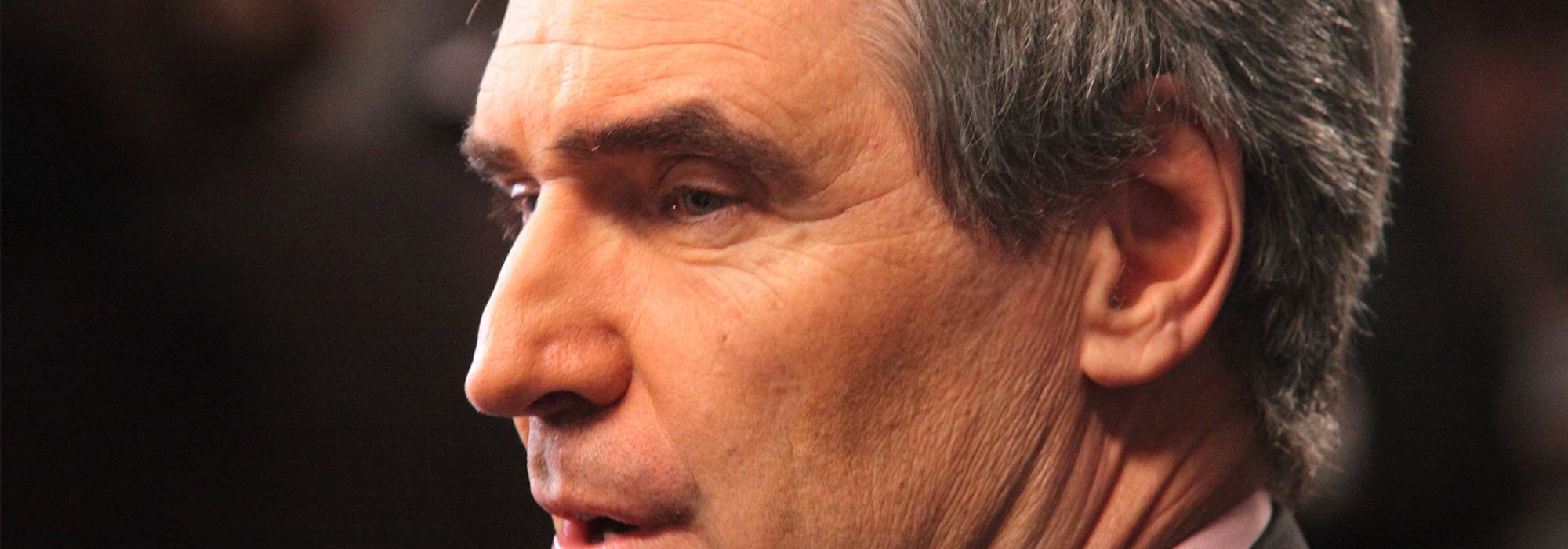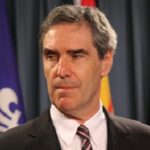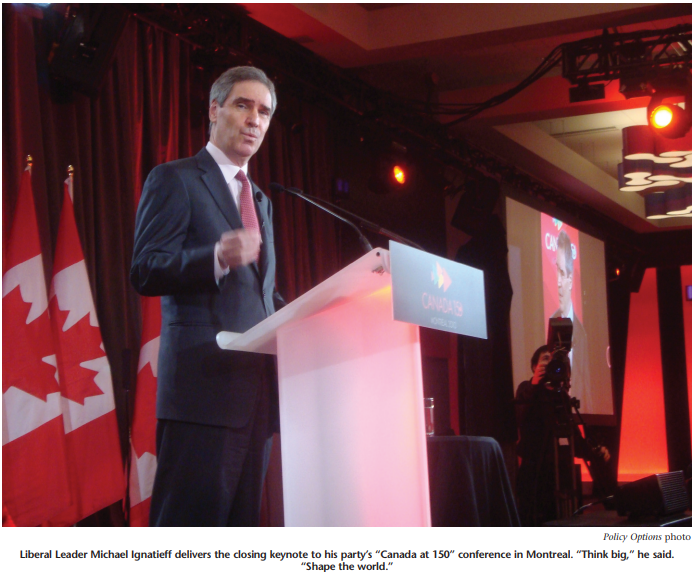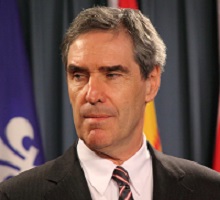
What started as a conference became a community — one room in Montreal, networked with more than 70 other gatherings across Canada, and 25,000 individuals. Today’s technology was deployed to enable a truly public dialogue about public policy. “Canada at 150: Rising to the Challenge” was a conversation about Canada’s future among experts and engaged citizens. The result was a clearer view about not just what we’d like to do as a country, not just about what we could do, but above all what we must do.
We must act on some fundamental challenges that were raised at the beginning of the weekend: an aging population, slower economic growth, the rising cost of caring for those in need. For example, Rick Miner, President Emeritus of Seneca College, outlined the challenge we have ahead of us as a result of inadequate skills training and the aging population: a labour market of jobs without people and people without jobs. This is a great country with an extraordinary future, but unless we face up to challenges such as this, and address them honestly, we shouldn’t be in politics.
Two of our generation’s leading economists, Pierre Fortin and David Dodge, explained the future in compelling terms — the aging population, sluggish productivity, spiralling costs of essential social services. And it isn’t a weather forecast. This is not something that might happen. If unchecked, these dynamics will erode our standard of living.
Over the weekend we must have heard it 20 times. On so many of the great challenges facing our country, we need a national strategy, a pan-Canadian strategy. Of course, respecting the jurisdictions of each province, but we must act together as a country. Not just provinces and territories working separately. It means we have to be a country with all the players at the table taking action, with clearly defined responsibilities.
I heard very clearly that we need a national strategy for knowledge and innovation.
This means a pan-Canadian learning plan, because we cannot face the future without one. It’s essential, not merely something we would like to do. What does that mean? It does mean early learning and child care for every Canadian family that wants it. It has to mean closing the gap between Aboriginal and non-Aboriginal educational attainment. It has to mean making illiteracy a national priority, for all orders of government, and for everyone in the system who teaches and learns. It has to mean better language training for immigrant families that come to this country. And we have to keep higher education affordable for Canadian families — so that we can keep a simple promise. A promise that’s been part of my political life since I entered politics: If you get the grades, you get to go.
And to pick up a theme that former UBC president Martha Piper and Dominic Barton, head of McKinsey and Company, touched on: there’s an international dimension to a learning strategy. We can export educational services to the developing world. There are five million people in Asia who we could be teaching, and leveraging the tremendous reputation we have in education.
A second thing we heard clearly was that we have to address the implications of our rapidly aging population.
We have costs that are increasing every year in health care, and we have families who have been crushed by the weight of taking care of their children and of elderly relatives. That is what is meant by the sandwich generation. In my vision of government, families have responsibilities, yes, but they need a caring government that stands with them, shoulder to shoulder.
Sherri Torjman from the Caledon Institute brought us face to face with some of the deficiencies of our social care system. If we’re going to help families, we must try to ensure that we’re not shoving the whole burden of care onto hospitals and nursing homes, because that’s the most expensive way to do it.
We want to do something very different. We want to invest in homecare, giving families resources to care for those they love at home. We’ve got a program that allows only six weeks of compassionate leave through Employment Insurance. Six weeks. Recently, I met a woman who explained to me that she has a beloved husband dying of Lou Gehrig’s disease. As she cares for the man she loves until the day he dies, all she gets is six weeks of compassionate leave. I want to help that woman and so does my party.
The burden of care on the sandwich generation is a crushing problem for Canadian families and for the Canadian economy. You can’t be a productive member of the workforce when you’re completely weighed down by the burden of care at home. We have to understand the interconnection between compassion and care and productivity. This is how we get a grip on our fiscal future and our moral future.
We have costs increasing every year in health care, and we have families who have been crushed by the weight of taking care of their children and of elderly relatives. That is what is meant by the sandwich generation. In my vision of government, families have responsibilities, yes, but they need a caring government that stands with them, shoulder to shoulder.
We repeatedly heard at the conference that an ounce of prevention is worth a pound of cure, and nowhere is this truer than in health care. As Dr. Marie-France Raynault from the Université de Montréal shared with us, there is a role for the federal government in health promotion. In the fight against obesity, in the fight against diabetes, we need a national strategy of preventive health care, with an active role for the federal government, working with the provinces. I see no way to contain rising health care costs without such a strategy.
A third priority is rebuilding Canada’s place in the world.
I was struck by a moment during a panel when Nicholas Parker, cofounder of the Cleantech Group, said that at Copenhagen the message from the international community was: “Canada, please leave the room so we can get something done.” Never before. And, I say, never again.
There’s another part of the Copenhagen story. We had Canadians talking across, against, apart from each other. It is so easy, six months, nine months before, for a prime minister to pick up the phone and say: we’re going to a global conference. The reputation of our country is on the line. Let’s try and work out some kind of common position. I want all the actors there. I want civil society there. I want us all there. But for heaven’s sake let’s speak with not just one voice, but a common voice.
This is crucial to the story of Canada’s international prestige overseas. We need to welcome the fact that so many Canadians speak for us in the world. I’m proud of the young people we met during the Canadians Making a Difference in the World panel. I’m proud of the people who are building wells in Africa. I want us to be, as I’ve said for a year and a half, the most international society in the world. I’m proud I was out there in the world for the years that I was. I’m deeply proud of it. I want more of us to be doing it.
We had several of the great figures of Canadian foreign policy with us at the conference in Montreal. We have reason to feel a little nostalgia for what Bob Fowler, Derek Burney and Jeremy Kinsman achieved. They were part of a world that actually believed that
Canada should have a foreign policy. That actually believed if you’re going to have a foreign policy, you’ve got to invest in diplomats, trade commissioners, consular officers. You’ve got to invest in the people who carry the privilege, the honour of representing our country in Shanghai, or in Lagos, or in South Africa. And we’ve let this shrivel and we’ve let this whither. We must make an investment in the people who speak for Canada overseas.
That is crucial to the future. In Montreal, these statesmen and others said something with one voice: Think big. Shape the world. Don’t allow the world to shape you. Don’t wait for the United States to shape our relationship. Shape that relationship.
We are the biggest supplier of energy to the United States, and yet we have no coherent view of how to manage that relationship. We have provinces pursuing various energy deals, working to get into the American markets. No one is talking about federal domination in this area — Ottawa doesn’t have the jurisdiction. But surely we can look at energy — not as a lever—but as a basis for a more strategic partnership through a coherent Canadian approach. We also have to work together toward the necessary public and private investments in clean energy, renewable energy and energy efficiency. Here’s where we need a network of responsibility. Our goal should be to end up being something very simple: the most energy efficient society on the planet. It’s where tomorrow’s productivity advantage lies, and everyone knows it.
Now I just want to reiterate — so that I’m clear. I don’t recall one instance when a presenter said, here’s the problem, and the solution is a big expensive federal program. One of the most useful things we did was to begin to rethink the role of government. How many times did we hear the word “network”? Creating networks of responsibility. Linking players together. Elected officials, the provinces and the federal level, the municipalities, social and nonprofit actors and, of course, the private sector.
This network concept of how we must govern ourselves — we need to think it through further and give it teeth. This is not an abstraction. We can feel this is how we actually live and work today. We need to make it a reality, a doctrine of the Liberal Party. We’re not a big government party. We’re the party of the network. The office of prime minister should not be simply about control. Real leadership is not about top-down command and control. That’s not how the world works today. A prime minister should not be there to dominate, to centralize, to steamroller. Those days are over. The prime minister’s most important role is to unify Canadians in the common purposes of our nation. To confront the real problems. To articulate what results our country must achieve, make strategic choices, and identify the key players and partners to solve those problems.
Excerpted from his closing address to the “Canada at 150” conference in Montreal, March 28, 2010.
Photo: Art Babych / Shutterstock










